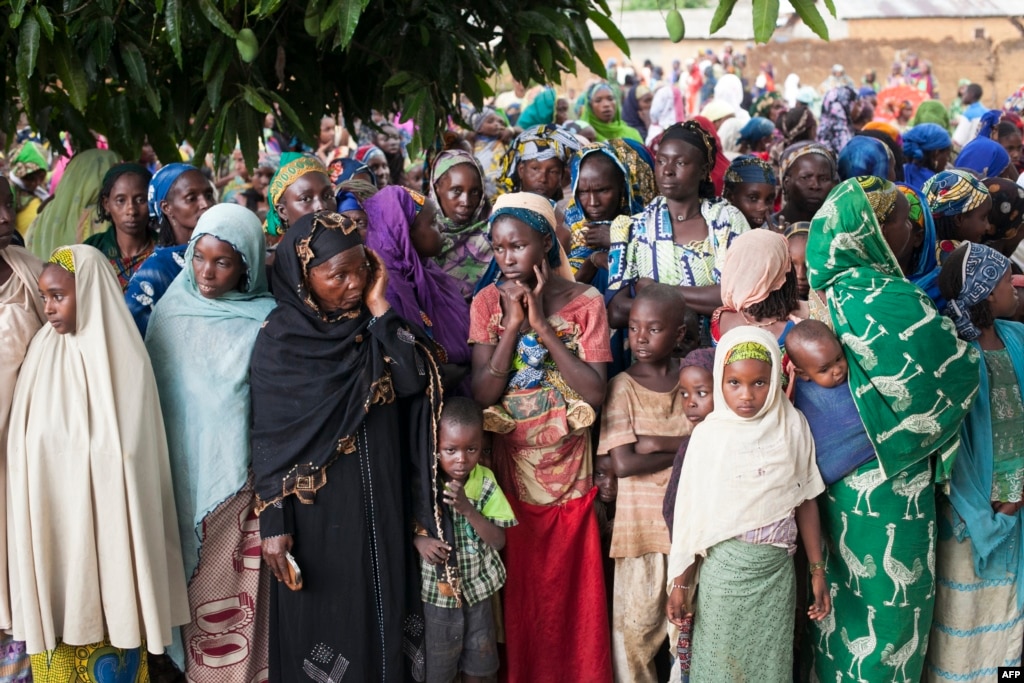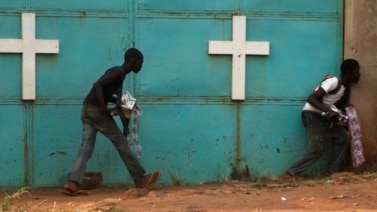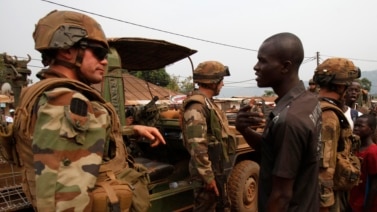
Thousands of people from the Central African Republic continue to flee Cameroon. They are escaping violence that continues even after a peace deal between the Muslim Seleka and Christian anti-balaka militias.
The refugees are finding relative peace in Cameroon’s refugee camps. But they are struggling with growing humanitarian needs, such as finding food. And some people in Cameroon are not happy that the refugees are there.
Yvette Faradongo has just lost her two-year-old daughter. Ms. Faradongo saved the girl from violence in the Central African Republic. She walked for three weeks from the C.A.R. village of Berberati to eastern Cameroon. But the child died from malnutrition; she did not have enough to eat.
Yvette Faradongo says she had to run after her son was shot in the leg and her sister died in clashes between the Séléka and anti-balaka groups.
Nearly everyone at the Giwa Yagambo refugee camp tells stories of great suffering. Francis Ndengo’s wife was killed in the violence. He says he continues to get bad news from his country.
He says he has just been told that a family member was shot and killed. He says his family fled to a Christian school, the Bangui-Bimbo St. Mark Major Seminary. He says he is doing his best to survive in Cameroon.
The United Nations says the number of refugees entering Cameroon has dropped from 10,000 a week to about 8,000. The Cameroon Red Cross says fewer people have been arriving because they are suffering from malnutrition and do not have the strength to travel.
Constancia Terribe is with the UNHCR -- the UN High Commissioner for Refugees. She says the agency is working with other groups to care for the refugees.
“We are working on this and we are trying to recover all these people because they have been traveling for a long time, maybe weeks, or some of them they have been walking through the forest, so they come exhausted and they come with, well, with some health issues. But this is why health is one of the major assistance that UNHCR and its partners give to the refugees.”
Francis Ndengo says some people in eastern Cameroon -- even local government officials -- are abusing the refugees.
He says the refugees cannot move out of the camps even when they are hungry. He says Cameroonian security forces do not accept the food cards given by the UNHCR as identification documents. He says some of the refugees are asked to make payments to stay in Cameroon. He says some local people ask them to work on their farms, but then refuse to pay them once the work is done.
Constancia Terribe says if Cameroon would accept the UNHCR identification documents, some of the problems of the refugees would be solved.
“This is (a) very young operation and to issue the, the refugee card, it takes time because it needs to be agreed with the Cameroon government. So we are working on it and we hope that we will be in the position to facilitate this document accreditate that they are refugee(s) and their situation in the country.”
Augustine Dolly Debat is a retired engineer from Bangui. He says the refugees will not be able to return home anytime soon. He says that for now, Cameroon is safer than their home.
He says the refugees will only be able to return when peace comes to the Central African Republic. He says the refugees fled to Cameroon because they know it is a peaceful country. So, he says, if there is no peace we cannot return, and how will the person who decides to go back home survive after losing everything?
The UNHCR estimates there are now more than 200,000 refugees from the Central African Republic in Cameroon.
I’m Christopher Cruise.
Correspondent Moki Edwin Kindzeka reported this story from eastern Cameroon. Christopher Cruise wrote it for VOA Learning English. George Grow was the editor.
Words in this Story
recover – v. to become healthy after an illness or injury; to return to normal health
exhausted – adj. to use all of one’s mental or physical energy; to tire out or wear out (someone) completely
issue – v. to give (something) to someone in an official way
facilitate – v. to make (something) easier; to help cause (something)
accredit – v. to say that something is good enough to be given official approval
Have you ever been a refugee? Are there refugees in your country? If so, how are they being treated? We want to hear from you. Write your thoughts in the comments section.

